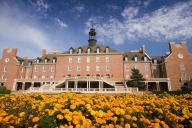You have /5 articles left.
Sign up for a free account or log in.

Jair Bolsonaro
Wikipedia
First, they announced they were considering withdrawing funding from sociology and philosophy programs. Writing on Twitter a week ago Friday, Brazil’s far-right president, Jair Bolsonaro said, “the goal is to focus on areas that will have immediate return to taxpayers, such as veterinary medicine, engineering and medicine.”
Then, they said there would be 30 percent cuts to three major federal universities: the University of Brasília, the Fluminense Federal University and the Federal University of Bahia. Brazil’s new minister of education, Abraham Weintraub, said the three universities -- all three of which are respected internationally -- are underperforming academically and hold "ridiculous" and partisan events. "The university must have a surplus of money to be making such a mess and organizing ridiculous events," he told the O Estado de São Paulo. The newspaper reported that he gave as examples of this mess "Members of the Landless Workers' Movement inside the campuses, naked people inside the campuses."
Then, they announced that the 30 percent cuts would apply not just to those three universities, but to all of Brazil’s federal universities. Higher education policy experts clarified that the proposed cuts do not affect faculty salaries -- faculty at the federal universities are civil servants -- but instead target the maintenance budgets of the universities, things like electricity and staff travel.
It has, in short, been an eventful 10 days for Brazilian higher education. Experts see the cuts to federal university budgets and threatened cuts to specific programs as ideologically motivated and part of a broader effort by the Bolsonaro government to roll back the signature achievement of former left-wing president Luiz Inácio Lula da Silva of expanding access to higher education.
“Bolsonaro campaigned on ending supposed leftist indoctrination in schools, so he’s going to make that happen,” said Jason Stanley, the Jacob Urowsky Professor of Philosophy at Yale University and author of How Fascism Works: The Politics of Us and Them, in which he wrote about international attacks by far-right governments on higher education (Penguin Random House, 2018).
“What we’ve been waiting to see is when there would be changes in policies for budgeting. It’s now coming,” said James N. Green, the Carlos Manuel de Céspedes Professor of Modern Latin American History at Brown University.
“First, they were singling out the universities [seen] as particularly intransigent, the Federal University of Bahia, the University of Brasilia and Fluminense Federal University. These are excellent universities, some of the top universities; they also have people within them who have organized events criticizing Bolsonaro,” Green said.
“Then it was made clear that you couldn’t target the universities to cut the funding without any real basis; they decided to expand it to 30 percent across the board, but the intentions were very clear,” Green said. “It’s to punish universities.”
The Estado reported that the initial 30 percent cuts to the three federal universities were part of about $1.5 billion in cuts to the Ministry of Education. "I can cut and unfortunately, I have to cut from somewhere," Weintraub, the education minister, said.
Weintraub, who was nominated for his post in April and is the second education minister since Bolsonaro assumed the presidency in January, has also said that the government’s priority is elementary and secondary education. “In the government plan that elected President Jair Bolsonaro, it was very clear, it was explicit, that our priority was basic education and preschool,” he said in a video posted on Twitter seemingly in response to protests regarding the cuts. “An undergraduate student costs 30,000 reais per year; a student in a day-care center costs 3,000 reais per year. For each undergraduate student I enroll in college, I could have 10 children in a day-care center -- children who are generally in a low-income family, poorer, more needy and who do not have day care for them today. What would you if you were in my position?”
In Brazil, however, the federal government has a relatively limited role in financing K-12 education, which is primarily financed by states and municipalities. “There is a real situation of budget constraints,” said Simon Schwartzman, an expert on Brazilian education and a member of the Brazilian Academy of Sciences. “But this kind of decision to cut 30 percent across the board [at federal universities] combines the need to make cuts with anti-intellectual reasons.”
“Announcing this specific set of cuts -- the 30 percent cut -- is absolutely ideologically motivated. There’s no other way to see it, because it wouldn’t be enough money to make a difference in public financing,” said Justin Axel-Berg, an associate researcher of higher education policy at the University of São Paulo. He added that the topic of cuts hadn’t been discussed until two to three weeks ago after Weintraub took office.
“This is a man who has been in his job for less than a month wanting to make an immediate impact,” Axel-Berg said.
Weintraub, an economist who before becoming education minister was a professor at the Federal University of São Paulo, has been a proponent of countering leftist ideology in universities and overcoming what’s described as “cultural Marxism.” He recently defended what he sees as the right of students to film their teachers in the classroom.
“This new minister has adopted this anti-cultural Marxist rhetoric of the entire Bolsonaro administration,” said Stephanie Reist, a postdoctoral researcher in education policy at the Federal Rural University of Rio de Janeiro. “They just say ‘cultural Marxism.’ It doesn’t mean anything, but they’re very much against any kind of critical race theory or feminism, or any sort of critical studies writ large.”
The proposal to defund philosophy and sociology programs has attracted worldwide outrage, though Axel-Berg cautioned that in the era of Bolsonaro it is difficult to separate proclamations on social media that may or may not have substance behind them from serious policy proposals. “How this is going to be achieved, nobody has any idea,” Axel-Berg said. “These aren’t people who have any kind of experience with higher education, with universities. It’s noise on Twitter being played to their electoral base.”
International academics are, however, taking the threat seriously. The American Philosophical Association and the American Sociological Association joined with several other groups in writing a letter protesting the move. Thousands of international academics have signed open letters. One such letter describes the attack on philosophy and sociology as “an attack on the very fabric of a democratic society.” Another letter says Bolsonaro’s “intent to defund sociology programs is an affront to the discipline, to the academy and, most broadly, to the human pursuit of knowledge. This proposal is ill conceived and violates principles of academic freedom that ought to be integral to systems of higher education in Brazil, in the United States and across the globe.”
Stanley, the Yale philosophy professor and author of How Fascism Works, said what’s happening in Brazil should be “a canary in the coal mine” for American academics. “This is not some exotic thing,” he said. “This is an international, worldwide far-right attack on the universities that is if anything more mainstream in the United States than in Brazil.”






